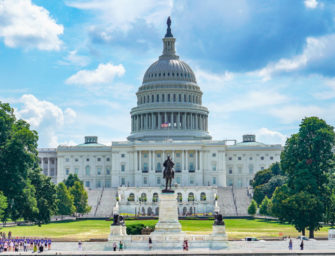AGU’s September 2022 Board Meeting
The AGU Board met in Washington DC in a hybrid format with approximately half of the Board members on Zoom, and half in person. After more than two years of learning how to do this since COVID’s unwelcome arrival, the hybrid format worked very well. At the on-site dinner, there were times when several of us were looking around and saying “Where’s <insert name>?”, only to remember that the person was in fact located several time zones away. Hybrid can work!
Informing a theme that is intertwined throughout AGU’s Strategic Plan, we began the first day with a generative discussion based on the recently held Chapman Conference, Second National Conference: Justice in Geoscience. After the Board watched Dr. Tiara Moore’s keynote address, the conversation focused on identifying ways in which AGU can make the greatest impact and improvement for its members. While there is no one solution that fits all institutions, cultures, individuals, disciplines, or indeed any parameter, high-level principles such as addressing toxicity in the workplace, understanding that the development of programs alone is not sufficient for progress, and that instituting reward structure(s) that emphasize shared responsibility are important. One meeting participant commented that “It is important for our community to have the uncomfortable conversations,” as that is often how progress is made and inclusivity is stimulated.
Next on the agenda was a discussion updating the Board on progress made on the “Ethical Framework for Climate Intervention,” which addresses issues relating to Carbon Dioxide Removal and the separate subject of Solar Radiation Management. Building on the recent IPCC reports that identify “net negative emissions” as being required for true mitigation, the Board’s focus was on what role is AGU uniquely qualified to play, with regard to the “ethical framework” as well as “governance”. After agreeing that AGU should predominantly remain focused on the ethical component, we further vocalized our support for AGU to pursue funding and partnerships in this initiative as long as the donors and partners are aligned with AGU’s goals and mission, and are not seeking opportunistic profit.
In order to ensure a healthy appetite for lunch, we turned to a discussion of the FY22 and FY23 budgets. While acknowledging challenges from national and international trends impacting the market and thus AGU’s endowment, due to prudent foresight and informed practices by our colleagues on the Finance and Investment Committee over the years, as well as our growing successes in seeking external support for some of our key programs, we are well positioned to still grow in service of the Strategic Plan’s goals and look forward to active management of our resources. As noted by senior staff, “There is a headwind but we are in good shape.”
After lunch, and an update about building space utilization in a post-COVID world, we discussed plans for how AGU can best provide a safe and healthy environment at the annual meeting as well as any AGU-sponsored meeting. Personal safety has been, and will remain, the highest priority for AGU and meeting attendees. We also discussed how other priorities (e.g., ease of transportation to the host city, hotel availability, etc.) can be best weighted as part of the meeting selection process. This discussion is ongoing and will have the highest degree of transparency possible to members given the central importance of AGU meetings at all scales.
Our first day closed with reports from two separate Task Forces, the first on “Social and Humanitarian Issues”, and the second on “Open Science”. Both were progress reports, and both emphasized the need for developing clear, consistent criteria for decision-making. Furthermore, the Board noted how these Task Forces and their respective goals, map onto AGU’s Strategic Plan, and offer opportunities to align AGU activities, member interests, and implementation of the Strategic Plan.
The morning of the second day was devoted to an in-depth discussion of the final report of the Governance Review Task Force, which was formed in late 2020. Their report includes a fascinating review of the excellent work done over the past 10+ years in improving governance and represents a refreshing approach to how AGU governance can remain nimble, responsive, and forward-looking. The proposed improvements represent evolution, not revolution. Discussions included relative strengths/weaknesses of paired ballots, single slate, ranked choice, etc., as well as the roles and responsibilities of the Council and how to best perhaps incorporate a “networked” model of information flow, as well as structure. These were initial discussions only designed to stimulate further consideration involving the AGU advisory structure.
During open conversation at the end of the meeting, there was discussion about how AGU staff can best be supported when faced with disrespectful or unkind behavior from members, either online or at meetings. One of AGU’s key tenets is “Respect” in that “AGU acts with respect and humility” and this extends not only within the membership and intellectual sectors but also as part of the relationships between membership, staff and partners.
The meeting closed with best wishes for safe travel and thoughts of our colleagues in many locations dealing with the aftermath of Hurricane Ian.



There are no comments
Add yours